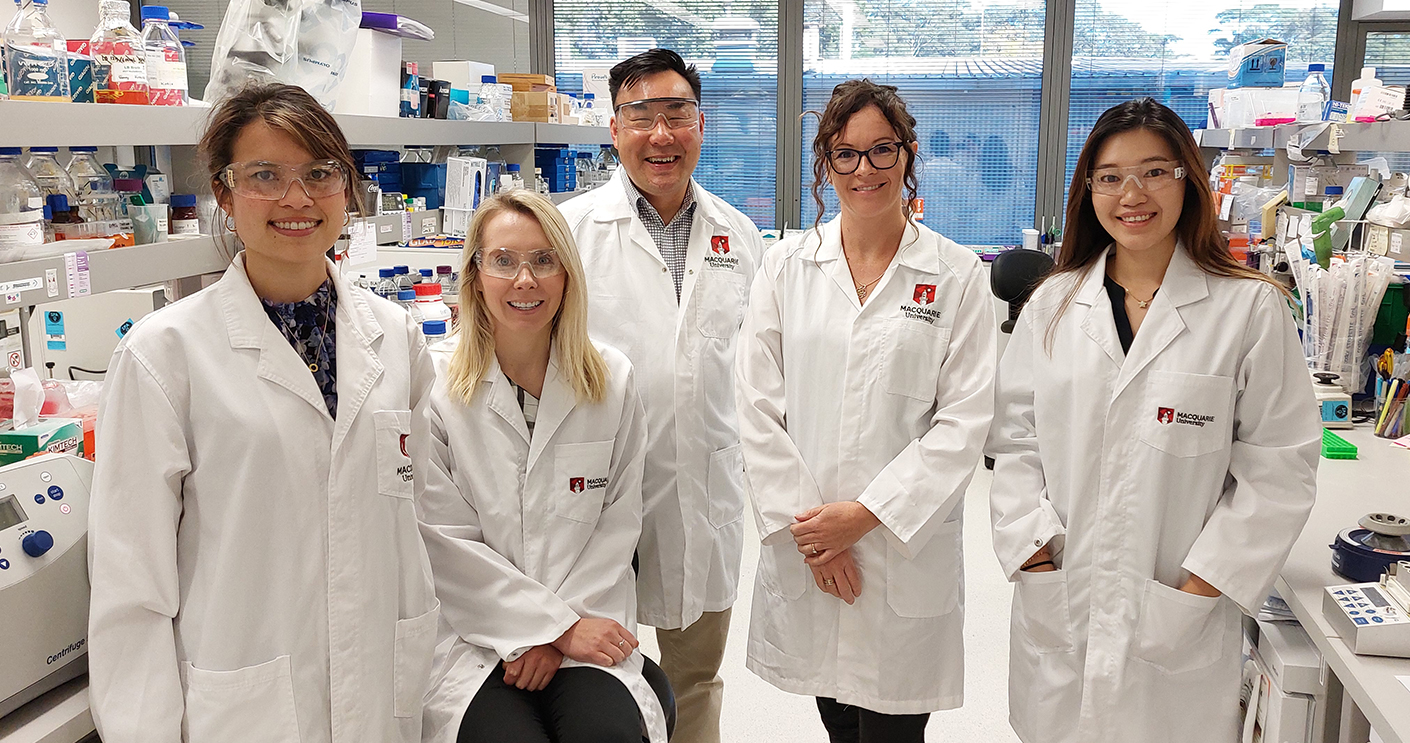Pictured L to R: Dr Stephanie Rayner, Dr Lyndal Henden, Professor Roger Chung, Associate Professor Kelly Williams and Flora Cheng
Researchers from the Macquarie University Motor Neuron Disease (MND) Research Centre have been awarded more than $3 million in funding by Australian charity FightMND.
Professor Roger Chung and Dr Lyndal Henden received project grants, Associate Professor Kelly Williams and Dr Stephanie Rayner received fellowships, and student Flora Cheng received a PhD scholarship.
The funding focuses on investigating disruptions to molecular programming that cause MND; identifying further genetic mutations linked to the disease; developing a way to control gene therapies more precisely; understanding the causes of protein aggregation in neurons; developing a small-molecule treatment to clear away the build-up of pathological proteins in neurons; and furthering the understanding of these build-ups.
Professor Roger Chung: Discovery Grant – $1 million: This grant will fund a project that aims to identify how the disruption of molecular programming inside neurons causes MND. The research will use next-generation RNA sequencing techniques to develop a high-resolution map of gene expression in neurons and determine how those change in patients with MND.
Professor Chung has also received a $300,000 Impact Grant to fund research into developing a method for the precise control of therapeutic gene expression resulting from gene therapy. Currently, when gene therapy is administered, it expresses the therapeutic transgene continuously to work throughout the patient’s life. This project aims to develop a way of allowing the therapy to be switched off when it has fulfilled its purpose.
Associate Professor Kelly Williams: Mid-career Fellowship – $680,000: Uncovering disease-causing genes in MND has transformed clinical practice and led to the development of gene therapies. During this four-year fellowship, three complimentary research projects will aim to identify genes with links to inherited MND, sporadic (or non-familial) MND, and instances where only one twin in a pair develops the disease. Large-scale national and international genomics resources will be used, including those generated from samples in the Macquarie University Neurodegenerative Diseases Biobank.
Dr Stephanie Rayner: Early-career Fellowship – $580,000: TDP-43 is a protein that builds up in the neurons of MND patients, ultimately resulting in cell death. This grant will fund the development of a small molecule treatment to enhance the clearance of TDP-43 aggregates by tagging them for the body to recycle. As part of the four-year fellowship, Dr Rayner will spend six months based at Stanford University in the United States and 18 months at the University of Sydney, before returning to Macquarie.
Dr Lyndal Henden: Impact Grant – $300,000: This two-year project will compare DNA from the blood and brain tissue of patients with sporadic MND, with a view to uncovering brain-specific genetic defects. Genetic defects are the only proven cause of MND, and they have great potential for use in diagnostics and the development of gene therapies. However, only a small proportion of patients with sporadic MND have an identified defect known to cause the disease, potentially because the DNA analysed is usually taken from blood rather than from MND-affected brain tissue.
Flora Cheng: Angie Cunningham PhD scholarship and Grant-in-Aid Award – $205,000: This funding will support a three-year PhD project that aims to understand the interplay between protein-binding RNA and RNA-binding proteins in cells that contain pathological TDP-43. It will provide unique insight into how individual protein constituents contribute to the build-up or inappropriate placement of TDP-43, and the pathogenic mechanisms of toxicity.
FightMND was co-founded in 2014 by AFL legend Neal Daniher, who was diagnosed with MND in 2013. The charity is one of the world’s largest independent funders of MND research, investing more than $95 million in research and care initiatives in Australia in the past nine years.
Learn more about the work of the Macquarie University MND Research Centre.


 Back to homepage
Back to homepage
ALS is a cruel disease. My mum is 83 and had great difficulty speaking and swallowing much of anything. Food was getting trapped in her throat and blocking her air way was happening more often. she battled for each breath. The riluzole did very little to help her. The medical team did even less. Her decline was rapid and devastating. The psychological support from the medical centre was non-existent and if it were not for the sensitive care and attention of our primary physician, there she would have died. There has been little if any progress in finding a cure or reliable treatment. Acupuncture eased her anxiety a bit. this year our primary physician started her on Natural Herbs Centre ALS/MND Ayurvedic treatment, 6 months into treatment she improved dramatically. It has been a complete turnaround with her speech, she no longer needs the feeding tube to feed, the treatment is a miracle. She recovered significantly! Visit Naturalherbscentre